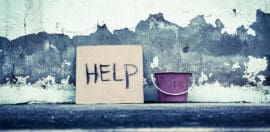‘Closing schools means much more than just a lost education’

Aisha*, 15, is one of many other children in her village in Ethiopia to have stopped going to school due to the Coronavirus pandemic. Photo: Seifu Asseged/ Save the Children.
2 August 2020 at 10:30 am
We need more international support to stop COVID-19 mutating from a global health emergency into a global education emergency, writes Paul Ronalds, group CEO of Save the Children in Australia.
You could hear the disappointment and frustration across Melbourne as the premier announced that the city would return to lock down earlier this month. One big collective – albeit slightly muffled – sigh.
Some of the loudest groans have escaped from under the masks of those, like me, with children who have returned to home-schooling.
Trying to juggle the demands of work while helping with essays and math problems is no simple task.
It’s easy to start looking inward at a time like this.
But we shouldn’t.
Masks might be mandatory, but blinkers are not, and in the scheme of things my children are incredibly lucky. They have computers, access to the internet, and they continue to get support from their teachers.
Many other children around the world are not so fortunate.
As the first wave of the pandemic hit, up to 1.6 billion children were forced out of school. For many, this meant their education stopped entirely.
For example, a Save the Children survey in India found that two-thirds of children stopped all educational activity during lockdown.
But the real concern is that for many children a temporary loss of education may become permanent.
Earlier this month, Save the Children issued a report highlighting the risk that 10 million children may never return to school due to COVID-19, reversing decades of development progress.
This is on top of the 258 million children who were already out of school before the pandemic hit.
Girls have been particularly impacted. In the countries with the worst education outcomes, it’s girls and children from poverty-stricken families that are hardest hit. Many of these children risk being forced into child labour or early marriage.
Meanwhile, abysmal pre-pandemic learning levels are set to worsen. Already, half of all children in low and middle income countries are unable to read a simple sentence by the end of primary school.
Of course, closing schools means much more than just a lost education.
For many children, school closure takes away safe places where children can play, have meals and access health services, including mental health. Teachers are often front-line responders and protectors for children who might suffer from abuse at home. With school closures, these safeguards fall away.
What can be done?
To highlight the global education challenge posed by COVID-19, Save the Children this month launched a new global Save Our Education campaign.
We are urging donors, including Australians, to ensure out-of-school children have access to distance learning and protection services. Those who return to school should be able to do so in a safe and inclusive way, with access to school meals and health services. Learning assessments and catch up classes must be adapted so that children can make up for their lost learning.
We are also stepping up our own investment in distance learning initiatives.
In March, edutech not for profit Library For All joined the Save the Children family. Library For All curates culturally relevant, age appropriate books in local languages. This content is made available free to anyone with an android device, or via specially designed digital classroom kits.
Alongside these kinds of high-tech solutions, Save the Children is also using a range of lower tech solutions.
Video calls are not much help for students who don’t have computers or internet access. For those students, we are working alongside governments to provide lessons and support through radio, television, phone, social media, messenger apps and paper-based home learning kits. For example, in Ethiopia we have secured nine dedicated satellite TV channels at no cost until the end of 2020 to support remote learning.
Longer-term, we need to make sure that education budgets are not hollowed out by recession and the diversion of public spending – and international aid – to health care and economic recovery. We are deeply concerned that governments in low- and middle-income countries could end up spending US$77 billion less than planned on education over the next 18 months.
We need more international support to stop COVID-19 mutating from a global health emergency into a global education emergency.
Most of the world’s poorest countries, including many Pacific nations in our own region, entered the economic downturn with limited fiscal space. That room for manoeuvre is now shrinking further as recession bites and external-debt problems intensify.
Rich-country governments have responded to the COVID-19 crisis by tearing up their fiscal and monetary policy rulebooks and underwriting ambitious national recovery plans. They should be equally bold in supporting education in developing countries.
Without this support and with education so closely tied to employment, improved health and economic development, COVID-19 will not only set back global education progress by decades, it will make the world less wealthy, less stable and less fair for all.







